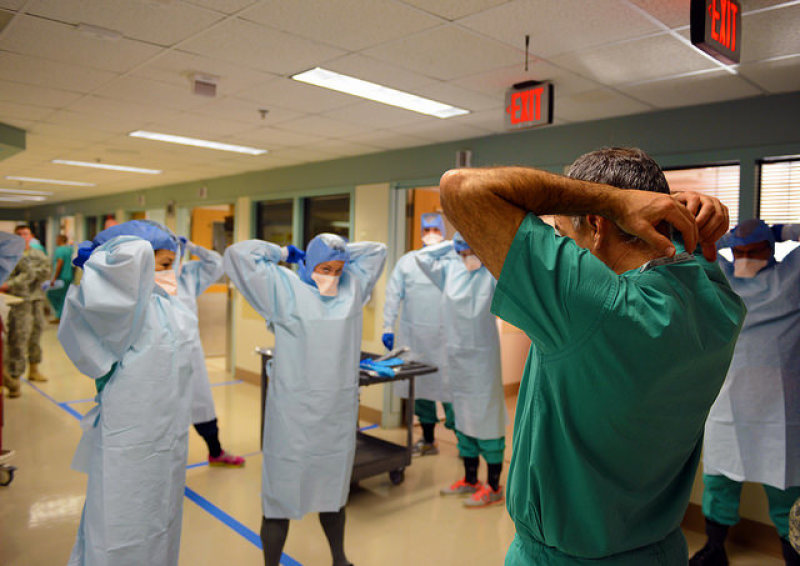

Navy Cmdr. James Lawler (right), a member of the Department of Defense (DoD) medical support team training, and a group of students at the San Antonio Military Medical Center, practice removing personal protective equipment. October 24, 2014.
President Obama has requested Congress to grant $6.18 billion to "implement a comprehensive strategy" against Ebola domestically as well as at the source in Africa, according to a letter released on Wednesday.
"My foremost priority is to protect the health and safety of Americans, and this request supports all necessary steps to fortify our domestic health system and prevent any outbreaks at home. Over the longer term, my Administration recognizes that the best way to prevent additional cases at home will be to contain and eliminate the epidemic at its source in Africa," he continued.
$4.64 billion was immediately requested for the response strategy, and the White House requested that the rest of the money be saved as a contingency fund. A majority ($2.43 billion) would go to the Department of Health and Human Services for various response efforts, including investing in the Centers for Disease Control and Prevention (CDC) for more effective readiness and treatment within the U.S. and in Africa. Other aspects of the response strategy includes education and outreach, having effective burial teams, and "the acquisition of appropriate protective equipment."
The U.S. has been making efforts to fight Ebola domestically and internationally, as it has deployed 2,000 service workers to West Africa from various U.S. departments, an official told NBC News. Other nations also have been putting in efforts, as reports on Wednesday said that China plans to send 1,000 to West Africa, and Cuba has been receiving worldwide recognition and praise for its effective response and involvement in fighting the virus.
The White House's request also comes in the midst of a tide of good news in terms of Ebola. The Spanish nurse's aide, who was the first to contract the virus outside of Africa, was released from the hospital Wednesday. And the World Health Organization announced last week that new Ebola cases have been leveling off in Liberia and Guinea.
But Dr. William Schaffner, an infectious disease specialist at Vanderbilt, told Fox that it may be too early to determine whether guards can be let down.
"I'm not so sure we are in that second phase just yet. I hope it's true, but until we have a more sustained period where the curve is flat, I think we're going to be hopeful but cautious," he said. Schaffner also told Fox that the numbers over the next two weeks may determine whether the outbreak has indeed entered into a second phase of leveling off.

















